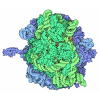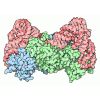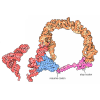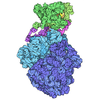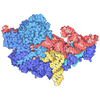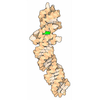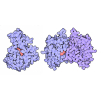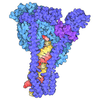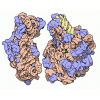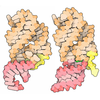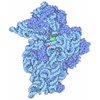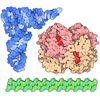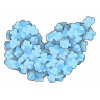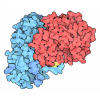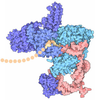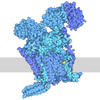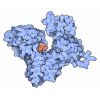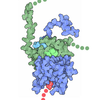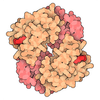+ Open data
Open data
- Basic information
Basic information
| Entry | Database: PDB / ID: 7aav | |||||||||||||||||||||
|---|---|---|---|---|---|---|---|---|---|---|---|---|---|---|---|---|---|---|---|---|---|---|
| Title | Human pre-Bact-2 spliceosome core structure | |||||||||||||||||||||
 Components Components |
| |||||||||||||||||||||
 Keywords Keywords | SPLICING / Complex / spliceosome / catalytic activation | |||||||||||||||||||||
| Function / homology |  Function and homology information Function and homology informationmicrofibril / regulation of retinoic acid receptor signaling pathway / regulation of vitamin D receptor signaling pathway / nuclear retinoic acid receptor binding / embryonic brain development / U2-type catalytic step 1 spliceosome / RNA splicing, via transesterification reactions / pre-mRNA binding / positive regulation of mRNA splicing, via spliceosome / mRNA 3'-end processing ...microfibril / regulation of retinoic acid receptor signaling pathway / regulation of vitamin D receptor signaling pathway / nuclear retinoic acid receptor binding / embryonic brain development / U2-type catalytic step 1 spliceosome / RNA splicing, via transesterification reactions / pre-mRNA binding / positive regulation of mRNA splicing, via spliceosome / mRNA 3'-end processing / Notch binding / host-mediated activation of viral transcription / mRNA cis splicing, via spliceosome / U2-type precatalytic spliceosome / positive regulation of vitamin D receptor signaling pathway / nuclear vitamin D receptor binding / U2-type spliceosomal complex / Transport of Mature mRNA derived from an Intron-Containing Transcript / Regulation of gene expression in late stage (branching morphogenesis) pancreatic bud precursor cells / RUNX3 regulates NOTCH signaling / U2-type catalytic step 2 spliceosome / NOTCH4 Intracellular Domain Regulates Transcription / RNA Polymerase II Transcription Termination / NOTCH3 Intracellular Domain Regulates Transcription / positive regulation of neurogenesis / : / K63-linked polyubiquitin modification-dependent protein binding / nuclear androgen receptor binding / WD40-repeat domain binding / precatalytic spliceosome / Notch-HLH transcription pathway / Formation of paraxial mesoderm / SMAD binding / positive regulation of transforming growth factor beta receptor signaling pathway / mRNA Splicing - Minor Pathway / spliceosomal tri-snRNP complex assembly / Prp19 complex / U5 snRNA binding / U5 snRNP / intrinsic apoptotic signaling pathway in response to DNA damage by p53 class mediator / positive regulation of G1/S transition of mitotic cell cycle / U2 snRNA binding / U6 snRNA binding / pre-mRNA intronic binding / protein localization to nucleus / U1 snRNA binding / Cajal body / retinoic acid receptor signaling pathway / U4/U6 x U5 tri-snRNP complex / cellular response to retinoic acid / catalytic step 2 spliceosome / mRNA Splicing - Major Pathway / RNA splicing / DNA damage checkpoint signaling / positive regulation of RNA splicing / nuclear receptor binding / positive regulation of protein export from nucleus / RNA polymerase II transcription regulatory region sequence-specific DNA binding / response to cocaine / spliceosomal complex / Downregulation of SMAD2/3:SMAD4 transcriptional activity / mRNA splicing, via spliceosome / protein modification process / positive regulation of protein import into nucleus / NOTCH1 Intracellular Domain Regulates Transcription / Pre-NOTCH Transcription and Translation / Constitutive Signaling by NOTCH1 PEST Domain Mutants / Constitutive Signaling by NOTCH1 HD+PEST Domain Mutants / cellular response to xenobiotic stimulus / nuclear matrix / fibrillar center / protein tag activity / mRNA processing / calcium-dependent protein binding / cellular response to tumor necrosis factor / transcription corepressor activity / microtubule cytoskeleton / cellular response to lipopolysaccharide / DNA-binding transcription activator activity, RNA polymerase II-specific / nuclear membrane / DNA-binding transcription factor activity, RNA polymerase II-specific / transcription coactivator activity / nuclear speck / nuclear body / DNA repair / negative regulation of DNA-templated transcription / intracellular membrane-bounded organelle / mRNA binding / GTPase activity / centrosome / regulation of transcription by RNA polymerase II / chromatin / GTP binding / enzyme binding / negative regulation of transcription by RNA polymerase II / positive regulation of transcription by RNA polymerase II / mitochondrion / DNA binding / RNA binding / zinc ion binding Similarity search - Function | |||||||||||||||||||||
| Biological species |  Homo sapiens (human) Homo sapiens (human)synthetic construct (others) | |||||||||||||||||||||
| Method | ELECTRON MICROSCOPY / single particle reconstruction / cryo EM / Resolution: 4.2 Å | |||||||||||||||||||||
 Authors Authors | Townsend, C. / Kastner, B. / Leelaram, M.N. / Bertram, K. / Stark, H. / Luehrmann, R. | |||||||||||||||||||||
| Funding support |  Germany, 1items Germany, 1items
| |||||||||||||||||||||
 Citation Citation |  Journal: Science / Year: 2020 Journal: Science / Year: 2020Title: Mechanism of protein-guided folding of the active site U2/U6 RNA during spliceosome activation. Authors: Cole Townsend / Majety N Leelaram / Dmitry E Agafonov / Olexandr Dybkov / Cindy L Will / Karl Bertram / Henning Urlaub / Berthold Kastner / Holger Stark / Reinhard Lührmann /  Abstract: Spliceosome activation involves extensive protein and RNA rearrangements that lead to formation of a catalytically active U2/U6 RNA structure. At present, little is known about the assembly pathway ...Spliceosome activation involves extensive protein and RNA rearrangements that lead to formation of a catalytically active U2/U6 RNA structure. At present, little is known about the assembly pathway of the latter and the mechanism whereby proteins aid its proper folding. Here, we report the cryo-electron microscopy structures of two human, activated spliceosome precursors (that is, pre-B complexes) at core resolutions of 3.9 and 4.2 angstroms. These structures elucidate the order of the numerous protein exchanges that occur during activation, the mutually exclusive interactions that ensure the correct order of ribonucleoprotein rearrangements needed to form the U2/U6 catalytic RNA, and the stepwise folding pathway of the latter. Structural comparisons with mature B complexes reveal the molecular mechanism whereby a conformational change in the scaffold protein PRP8 facilitates final three-dimensional folding of the U2/U6 catalytic RNA. | |||||||||||||||||||||
| History |
|
- Structure visualization
Structure visualization
| Movie |
 Movie viewer Movie viewer |
|---|---|
| Structure viewer | Molecule:  Molmil Molmil Jmol/JSmol Jmol/JSmol |
- Downloads & links
Downloads & links
- Download
Download
| PDBx/mmCIF format |  7aav.cif.gz 7aav.cif.gz | 778.1 KB | Display |  PDBx/mmCIF format PDBx/mmCIF format |
|---|---|---|---|---|
| PDB format |  pdb7aav.ent.gz pdb7aav.ent.gz | 511.2 KB | Display |  PDB format PDB format |
| PDBx/mmJSON format |  7aav.json.gz 7aav.json.gz | Tree view |  PDBx/mmJSON format PDBx/mmJSON format | |
| Others |  Other downloads Other downloads |
-Validation report
| Arichive directory |  https://data.pdbj.org/pub/pdb/validation_reports/aa/7aav https://data.pdbj.org/pub/pdb/validation_reports/aa/7aav ftp://data.pdbj.org/pub/pdb/validation_reports/aa/7aav ftp://data.pdbj.org/pub/pdb/validation_reports/aa/7aav | HTTPS FTP |
|---|
-Related structure data
| Related structure data |  11693MC  7abfC  7abgC  7abhC  7abiC M: map data used to model this data C: citing same article ( |
|---|---|
| Similar structure data | |
| EM raw data |  EMPIAR-10616 (Title: Cryo-EM dataset of human pre-Bact spliceosome / Data size: 584.5 EMPIAR-10616 (Title: Cryo-EM dataset of human pre-Bact spliceosome / Data size: 584.5 Data #1: Motion-corrected micrographs (without dose-weighting) of human pre-Bact spliceosome [micrographs - single frame] Data #2: Motion-corrected micrographs (with dose-weighting) of human pre-Bact spliceosome [micrographs - single frame]) |
- Links
Links
- Assembly
Assembly
| Deposited unit | 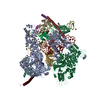
|
|---|---|
| 1 |
|
- Components
Components
-Protein , 11 types, 11 molecules rQLRKG8AvNq
| #1: Protein | Mass: 109560.625 Da / Num. of mol.: 1 / Source method: isolated from a natural source / Source: (natural)  Homo sapiens (human) / Cell line: Hela / References: UniProt: Q15029 Homo sapiens (human) / Cell line: Hela / References: UniProt: Q15029 |
|---|---|
| #2: Protein | Mass: 17032.850 Da / Num. of mol.: 1 / Source method: isolated from a natural source / Source: (natural)  Homo sapiens (human) / Cell line: Hela / References: UniProt: P41223 Homo sapiens (human) / Cell line: Hela / References: UniProt: P41223 |
| #3: Protein | Mass: 92406.883 Da / Num. of mol.: 1 / Source method: isolated from a natural source / Source: (natural)  Homo sapiens (human) / Cell line: HeLa / References: UniProt: Q99459 Homo sapiens (human) / Cell line: HeLa / References: UniProt: Q99459 |
| #4: Protein | Mass: 26674.447 Da / Num. of mol.: 1 / Source method: isolated from a natural source / Source: (natural)  Homo sapiens (human) / Cell line: Hela / References: UniProt: Q9P013 Homo sapiens (human) / Cell line: Hela / References: UniProt: Q9P013 |
| #5: Protein | Mass: 52050.527 Da / Num. of mol.: 1 / Source method: isolated from a natural source / Source: (natural)  Homo sapiens (human) / Cell line: Hela / References: UniProt: P55081 Homo sapiens (human) / Cell line: Hela / References: UniProt: P55081 |
| #6: Protein | Mass: 57280.758 Da / Num. of mol.: 1 / Source method: isolated from a natural source / Source: (natural)  Homo sapiens (human) / Cell line: Hela / References: UniProt: O43660 Homo sapiens (human) / Cell line: Hela / References: UniProt: O43660 |
| #8: Protein | Mass: 65612.180 Da / Num. of mol.: 1 / Source method: isolated from a natural source / Source: (natural)  Homo sapiens (human) / Cell line: Hela / References: UniProt: O60508 Homo sapiens (human) / Cell line: Hela / References: UniProt: O60508 |
| #10: Protein | Mass: 273974.250 Da / Num. of mol.: 1 / Source method: isolated from a natural source / Source: (natural)  Homo sapiens (human) / Cell line: Hela / References: UniProt: Q6P2Q9 Homo sapiens (human) / Cell line: Hela / References: UniProt: Q6P2Q9 |
| #12: Protein | Mass: 61610.703 Da / Num. of mol.: 1 / Source method: isolated from a natural source / Source: (natural)  Homo sapiens (human) / Cell line: Hela / References: UniProt: Q13573 Homo sapiens (human) / Cell line: Hela / References: UniProt: Q13573 |
| #13: Protein | Mass: 23664.047 Da / Num. of mol.: 1 / Source method: isolated from a natural source / Source: (natural)  Homo sapiens (human) / Cell line: Hela / References: UniProt: Q96NC0 Homo sapiens (human) / Cell line: Hela / References: UniProt: Q96NC0 |
| #17: Protein | Mass: 8560.945 Da / Num. of mol.: 1 / Source method: isolated from a natural source / Source: (natural)  Homo sapiens (human) / Cell line: Hela / References: UniProt: Q9BZL1 Homo sapiens (human) / Cell line: Hela / References: UniProt: Q9BZL1 |
-RNA chain , 4 types, 4 molecules Z256
| #7: RNA chain | Mass: 73712.359 Da / Num. of mol.: 1 / Source method: obtained synthetically / Source: (synth.) synthetic construct (others) |
|---|---|
| #14: RNA chain | Mass: 60186.445 Da / Num. of mol.: 1 / Source method: isolated from a natural source / Source: (natural)  Homo sapiens (human) / Cell line: Hela / References: GenBank: 36516 Homo sapiens (human) / Cell line: Hela / References: GenBank: 36516 |
| #15: RNA chain | Mass: 36908.668 Da / Num. of mol.: 1 / Source method: isolated from a natural source / Source: (natural)  Homo sapiens (human) / Cell line: Hela / References: GenBank: 36515 Homo sapiens (human) / Cell line: Hela / References: GenBank: 36515 |
| #16: RNA chain | Mass: 34098.270 Da / Num. of mol.: 1 / Source method: isolated from a natural source / Source: (natural)  Homo sapiens (human) / Cell line: Hela Homo sapiens (human) / Cell line: Hela |
-Pre-mRNA-splicing factor ... , 2 types, 2 molecules IP
| #9: Protein | Mass: 37563.863 Da / Num. of mol.: 1 / Source method: isolated from a natural source / Source: (natural)  Homo sapiens (human) / Cell line: Hela / References: UniProt: Q8NAV1 Homo sapiens (human) / Cell line: Hela / References: UniProt: Q8NAV1 |
|---|---|
| #11: Protein | Mass: 46959.555 Da / Num. of mol.: 1 / Source method: isolated from a natural source / Source: (natural)  Homo sapiens (human) / Cell line: Hela / References: UniProt: Q9NW64 Homo sapiens (human) / Cell line: Hela / References: UniProt: Q9NW64 |
-Non-polymers , 3 types, 3 molecules 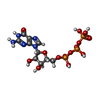




| #18: Chemical | ChemComp-GTP / |
|---|---|
| #19: Chemical | ChemComp-MG / |
| #20: Chemical | ChemComp-KGN / |
-Details
| Has ligand of interest | N |
|---|---|
| Has protein modification | N |
-Experimental details
-Experiment
| Experiment | Method: ELECTRON MICROSCOPY |
|---|---|
| EM experiment | Aggregation state: PARTICLE / 3D reconstruction method: single particle reconstruction |
- Sample preparation
Sample preparation
| Component |
| ||||||||||||||||||||||||
|---|---|---|---|---|---|---|---|---|---|---|---|---|---|---|---|---|---|---|---|---|---|---|---|---|---|
| Molecular weight | Units: MEGADALTONS / Experimental value: NO | ||||||||||||||||||||||||
| Source (natural) |
| ||||||||||||||||||||||||
| Source (recombinant) | Organism: synthetic construct (others) | ||||||||||||||||||||||||
| Buffer solution | pH: 7.9 | ||||||||||||||||||||||||
| Specimen | Embedding applied: NO / Shadowing applied: NO / Staining applied: NO / Vitrification applied: YES | ||||||||||||||||||||||||
| Specimen support | Grid material: COPPER / Grid type: Quantifoil R3.5/1 | ||||||||||||||||||||||||
| Vitrification | Instrument: FEI VITROBOT MARK IV / Cryogen name: ETHANE |
- Electron microscopy imaging
Electron microscopy imaging
| Experimental equipment |  Model: Titan Krios / Image courtesy: FEI Company |
|---|---|
| Microscopy | Model: FEI TITAN KRIOS |
| Electron gun | Electron source:  FIELD EMISSION GUN / Accelerating voltage: 300 kV / Illumination mode: SPOT SCAN FIELD EMISSION GUN / Accelerating voltage: 300 kV / Illumination mode: SPOT SCAN |
| Electron lens | Mode: BRIGHT FIELD |
| Image recording | Average exposure time: 1 sec. / Electron dose: 2.25 e/Å2 / Detector mode: INTEGRATING / Film or detector model: FEI FALCON III (4k x 4k) |
| Image scans | Width: 4096 / Height: 4096 |
- Processing
Processing
| EM software |
| ||||||||||||||||||||
|---|---|---|---|---|---|---|---|---|---|---|---|---|---|---|---|---|---|---|---|---|---|
| CTF correction | Type: PHASE FLIPPING AND AMPLITUDE CORRECTION | ||||||||||||||||||||
| 3D reconstruction | Resolution: 4.2 Å / Resolution method: FSC 0.143 CUT-OFF / Num. of particles: 39336 / Symmetry type: POINT | ||||||||||||||||||||
| Atomic model building | Protocol: RIGID BODY FIT / Space: REAL |
 Movie
Movie Controller
Controller







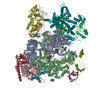



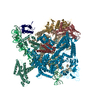

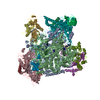
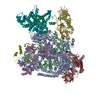
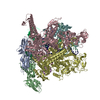
 PDBj
PDBj